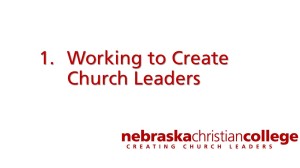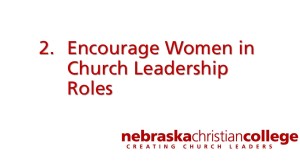We are beginning the new academic year at Nebraska Christian College this week with classes starting on Wednesday. I am teaching my seminar on “The Parables of Jesus,” perhaps for the last time. I have a great group of students signed up, so I am excited to begin.
I shared with my faculty three “points of emphasis” for this year. I believe these represent the future of our college, and perhaps the future of Christian higher education. Many schools that were begun with the purpose of preparing people for ministry have surely lost their way. The pressure from parents and constituents has been to provide public school teaching degrees, business degrees, psychology degrees, and many others. While it is certainly true that these programs can benefit from being taught from a Christian perspective, I don’t believe this is the same as providing leaders for the church of today and tomorrow. Here are my three points of emphasis:
This is what we are about, what we must do, what we are doing. I am encouraging my faculty to always be thinking about this when then write course objectives, create lesson plans, and make assignments: how does this help prepare my students to be church leaders?
We have disagreements among our faculty on the proper roles of women in church leadership. I, personally, don’t put any barriers to women in leadership, but I also believe that individual congregations will handle this differently. Nevertheless, I am asking my faculty to find ways to encourage women students in their callings to be church leaders.
I think the days are long gone when sectarianism has validity or value in work of the church. This does not mean that I am willing to accept anyone who calls himself or herself a Christian without qualifications., but we need to work within the broad tent of Bible-believing, Christ-honoring Christians and their churches. When we send students to churches to be workers or interns, we need to accept that those are our partners in the work of the Gospel, not our rivals or enemies. If we believe that we have better and more biblical doctrines, then let them stand. Truth finds a way. We are servants of the Word, ministers of the Gospel.
Yesterday, I had the privilege of attending Lifegate Church in west Omaha where my daughter is a member and listen to a message from Pastor Les Beauchamp. One of the things he talked about was that Lifegate would be a disappointment for folks who wanted a church with a political agenda or a narrow doctrinal focus. I don’t know Pastor Les, but he seems like the type of church leader who has managed to rise above the sectarianism that plagues many churches. That is the spirit we need to cultivate among our students and practice in our own lives.
Mark Krause
Nebraska Christian College



Mark, thanks for this very insightful article. I really enjoyed it. As a Prof. at St. Louis Christian College, I relate directly to everything you’re saying. One issue/question that seems to give Christian colleges some trouble is the idea that professors and adjuncts must be members of Christian Churches / Churches of Christ. Since those churches are our biggest constituents, that makes sense on a lot of levels. They send us a lot of financial help, as well as students and many other kinds of support.
However, it does severely limit the pool of potential teachers. Even in a large metro area like St. Louis, it can sometimes be a challenge to find people who 1) have at least a Master’s degree in the area we need, and 2) are practicing members of a Christian Church / Church of Christ. I’m wondering what your experience is with this issue because it ties in directly with your thoughts in the article.
Kent,
There is great challenge for Christian Church schools to try and retain their identity as Restoration Movement heirs. I think this is actually more difficult in an urban setting, where the Christian Churches can be sparse. We have a preference for Christian Church folks to teach, but cannot make this an absolute. Part of the reason is the variety of theological perspectives represented in Christian Churches, particularly in the larger churches.
MK